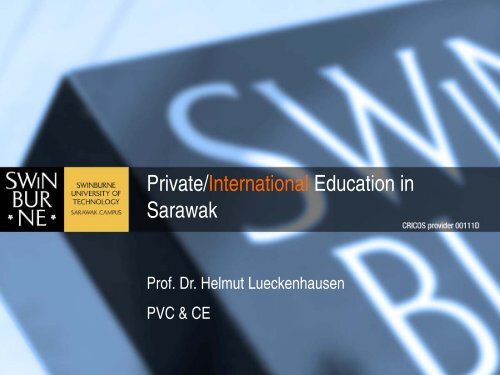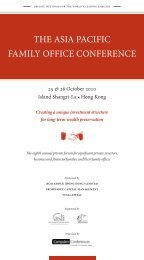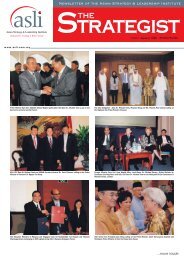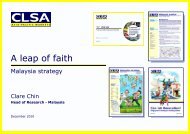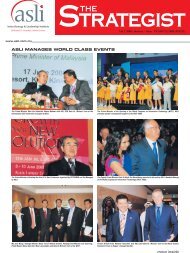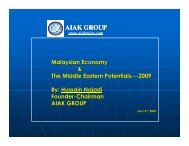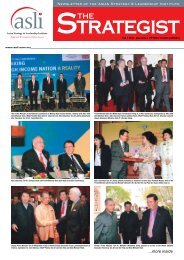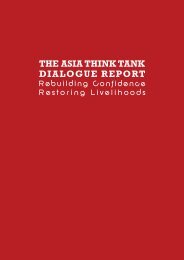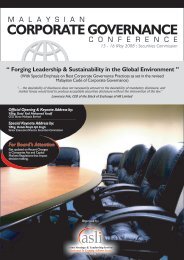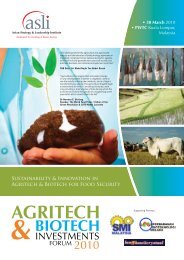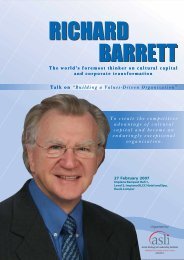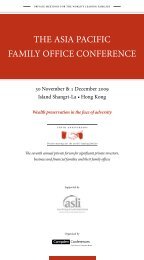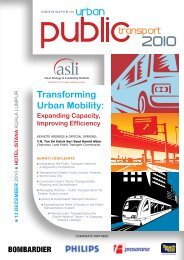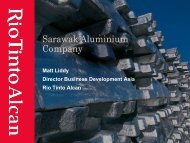Prof. Dr. Helmut Lueckenhausen
Prof. Dr. Helmut Lueckenhausen
Prof. Dr. Helmut Lueckenhausen
Create successful ePaper yourself
Turn your PDF publications into a flip-book with our unique Google optimized e-Paper software.
Private/International Education in<br />
Sarawak<br />
<strong>Prof</strong>. <strong>Dr</strong>. <strong>Helmut</strong> <strong>Lueckenhausen</strong><br />
PVC & CE
The Foreign Branch Campus<br />
> The ‘home University’ – Swinburne University of<br />
Technology, Melbourne, Australia<br />
> A public university – in Malaysian terms: Institut Pengajin<br />
Tinggi Awam (IPTA)<br />
> Swinburne University of Technology, Sarawak, a<br />
partnership between Swinburne Melbourne and the state<br />
government of Sarawak (GLC)<br />
However - Included in Malaysia under the list of Institut<br />
Pengajin Tinggi Swasta (IPTS)<br />
> Therefore: I speak from a ‘hybrid’, not a classic IPTS<br />
position
Primary task of the FBC in Sarawak<br />
• Affordability -<br />
• Accessibility -<br />
in comparison to studying overseas<br />
domestic location for Malaysian students<br />
• Possibility - availability of visas for international students<br />
• Manageability -<br />
• Employability -<br />
cultural, political, religious, safety<br />
internationally recognized, quality tertiary<br />
education
The second-stage task of the FBC in Sarawak<br />
After the deployment of undergraduate, postgraduate and research<br />
programs from the home campus into the host environment – what<br />
further ‘unique’ programs, projects and services can result from this<br />
international meld<br />
SUTS is identifying, designing and preparing to deploy research,<br />
T&L programs, and processes, that bring international expertise to<br />
bear on the specific HR needs of Sarawak and the region
International English<br />
Malaysian national policy builds social cohesion through the promotion of<br />
the national language – however: English is an international passport<br />
Swinburne operates in English – it contributes to the bridging between<br />
Bahasa Malaysia and other indigenous languages, Malaysian English,<br />
and international English<br />
Previous PM, <strong>Dr</strong>. Mahathir:<br />
“the Chinese graduates choose the right subjects so they are employable. We find that the Malay<br />
graduates, especially those from the Malay stream, can’t speak English at all. No matter how much<br />
value you put on a certificate, the fact remains that an employer wants somebody with whom he can<br />
communicate. The employer is not Malay, he is a foreigner - and if he’s not going to be able to<br />
communicate with you, he will not take you.” (Source: Wikipedia)
Securing income versus service delivery<br />
A private university dependent on student fees for its operating income<br />
may find its capacity to deliver social service severely hampered –<br />
service that is inevitably required by those with the least capacity to<br />
pay<br />
SUTS is developing its international, and those domestic markets<br />
with capacity to pay, to be able to cross subsidize those without<br />
capacity<br />
Sarawakian shareholders – Yayasan and SHEF are investing in the<br />
future of Sarawak, Swinburne is a vehicle
Opportunities<br />
The Shareholders, civil servants and (increasingly) the community<br />
appreciate that besides education and training, the investment in<br />
Swinburne Sarawak, results in:<br />
• Goodwill and State branding – Asians particularly, retain life-long<br />
affection for their educational mentors and the place of their<br />
education<br />
• Influx of Foreign (and increasingly), West Malaysian capital<br />
• Incubation of new areas of economic endeavour – the traditional<br />
building of community and economic outcomes that are seeded in<br />
a ‘University’ town
Demand for an Educated Workforce<br />
> Increasing industry demand for trained human capital<br />
especially in the areas of engineering, science and<br />
technology<br />
but also:<br />
business/entrepreneurship, the creative industries<br />
and applied research - for the development of new<br />
ideas and opportunities<br />
> Demand for graduates with hands-on education that<br />
meet industry needs, helps them find a job and<br />
remain employable (lifelong learning)
Demand for Educated Workforce<br />
As economies become more developed, their<br />
citizens demand greater access to education<br />
Numbers of tertiary students are growing<br />
exponentially world-wide and education (along with<br />
health) is demanding more and more capital.<br />
Even highly developed economies such as Germany<br />
(with its strong public service/welfare political ethos)<br />
are struggling to meet demand<br />
How can this situation be eased<br />
More and more by public and private partnerships
Student Enrollment in Other Countries<br />
Enrollment in Private Higher Education as a Percentage of Whole<br />
Korea 84%<br />
Philippines 76%<br />
Japan 76%<br />
India 75%<br />
Brazil 71%<br />
Indonesia 60%<br />
Mexico 56%<br />
Malaysia<br />
22% (2007 – 5 years later)<br />
Source: Korea, latest ADB est 2001, others IBRD/FC 2000, OECD 2001, Levy-research on Private HE<br />
April 2002, Malaysia MoHE 2007
Student Enrollment in Malaysia<br />
(Source: MoHE Website)<br />
Institutions 2004 2005 2006 2007 % +/-<br />
Public Universities 293,987 307,121 331,025 369,117 + 20.4<br />
Private Universities<br />
and University Colleges<br />
89,664 128,330 171,702 191,795 + 53%<br />
Private Colleges 233,227 185,647 152,085 174,005 - 34%<br />
Polytechnics 63,662 73,834 82,045 84,250 + 24%<br />
Community Colleges 8,945 9,873 11,273 14,438 + 38%
Prospects for Private Education in Sarawak<br />
> Globalization of markets and economies also impacts<br />
on Sarawak<br />
> Demand for highly qualified and capable human<br />
resource puts huge pressure on publicly funded<br />
educational organizations<br />
> Developed and developing economies alike are<br />
witnessing enormous growth in demand for<br />
internationally recognized quality training and higher<br />
education<br />
> Recession actually increases demand on<br />
education facilities
Prospects for Private Education in Sarawak<br />
E.G. SCORE<br />
(Source: www.sarawakscore.com.my)<br />
> SCORE – A major initiative undertaken to develop the Central<br />
Region & transform Sarawak into a developed State by the year<br />
2020<br />
> Development – three phases (2008 to 2030)<br />
> Objective – accelerate human capital development within the<br />
Corridor with new learning centres and controlled immigration of<br />
skilled foreign workers.<br />
> Benefit – Creation of 1.5million new jobs
Prospects for Private/International Education<br />
in Sarawak<br />
Potential to develop Edu-tourism<br />
> Swinburne notes constant requests from overseas for<br />
study in Borneo – still one of the ‘magic’ places in the<br />
world’s imagination<br />
But we need edu/eco educational products with<br />
genuine academic merit<br />
> Need to capitalize on the rich natural resources<br />
Sarawak has to offer by partnering study and<br />
research programs with field study and in-situ<br />
experiential learning.
Prospects for Private Education in Sarawak<br />
Research and Development in selective areas such as<br />
biotechnology, civil engineering/soft soils etc.<br />
High quality research requires infrastructure and professional<br />
capacity – such as University research centres with an<br />
international network<br />
A large, strategically, if regionally, located state with a small<br />
population needs to maximize its research potential by dispersing<br />
funding where it can produce results for the state, against a strict<br />
agreement on commercially viable outcomes and to a realistic<br />
timetable
How Will Sarawak Attract Foreign Students<br />
Opportunities<br />
> Sarawak needs further promotion as an ideal and<br />
safe environment for learning and living<br />
> Sarawak can promote the lower cost of living in<br />
comparison with other major cities in the region<br />
> Malaysia/Sarawak is currently reliant on cost of fees<br />
advantage as an attraction to foreign students<br />
> Foreign branch campuses leverage on the<br />
international reputation and networks of their main<br />
campuses to attract foreign students to Sarawak
How will Sarawak Attract Foreign Students<br />
Challenges<br />
> Sarawak has relatively lower level of awareness<br />
internationally, MoHE Malaysia needs to provide<br />
better exposure to education opportunities in<br />
Sarawak<br />
> West Malaysian students are generally reluctant to<br />
consider Sarawak as a study destination – the<br />
domestic profile needs to be improved first<br />
> International students want job opportunities and<br />
experience – Sarawak needs more liberal policies on<br />
work visas for students during and after study
How can Sarawak be Developed as a Regional<br />
Education Hub<br />
A large, regional state with a small population needs<br />
to maximize its education delivery potential by<br />
fostering cooperation and collaboration between<br />
institutions in the State, both public and private<br />
There exists too little critical mass in educational<br />
infrastructure and intellectual property to keep state<br />
potential divided by parochialism or mini empire<br />
building
How Can Sarawak be Developed as a Regional<br />
Education Hub<br />
> Promotion of a “Centre of Education Excellence” and<br />
organization of collective promotional effort of<br />
Sarawak as a study destination nationally and<br />
internationally<br />
> Involvement of relevant state government agencies in<br />
active promotion of Sarawak as a destination that is<br />
ideal for living and education amidst the tourism<br />
attractions<br />
> Improve coordination between state government<br />
agencies and MoHE Malaysia in the promotion of<br />
Sarawak
How Can Sarawak be Developed as a Regional<br />
Education Hub<br />
> Quality hurdles for institutions to be permitted to<br />
recruit foreign students require common agreement<br />
> Amenities large cohorts of incoming students need<br />
such as public transport, housing, access to health<br />
and other services require review/coordination<br />
> Linkage between industry and higher education<br />
institutions, to better align education capacity and<br />
human capital requirements in the State as well as<br />
the region needs brokering<br />
> Government-to-government initiatives for student<br />
sponsorship need targeting
Private/International Education in<br />
Sarawak<br />
<strong>Prof</strong>. <strong>Dr</strong>. <strong>Helmut</strong> <strong>Lueckenhausen</strong><br />
PVC & CE


